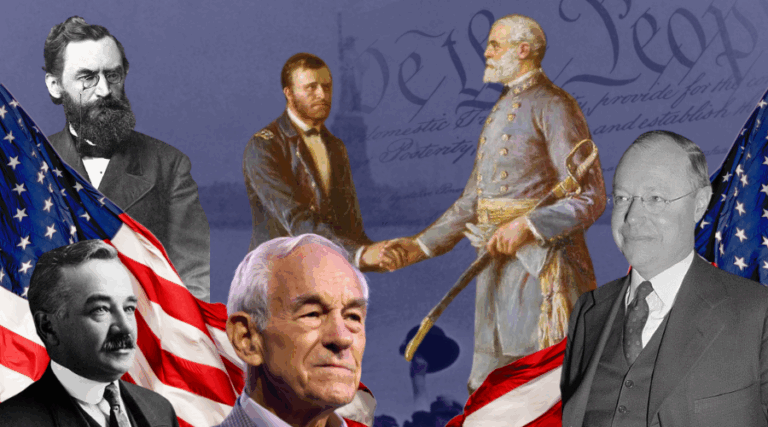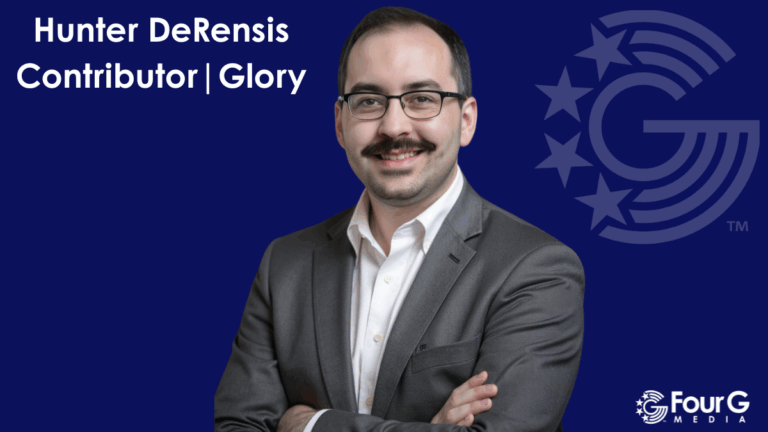Bigger than Ever: Americanism Returns with Hunter DeRensis

By Hunter DeRensis
I was asked to give a self-introduction to readers of this new column, which will be one of the four pillars of FourG Media. But I believe it’ll be more instructive to explain the world that made me, rather than list off some dry resume builders.
I don’t have descendants that go back to the Mayflower; there would be active debate on the Right whether my family name qualifies for admission into the term “Historic American Nation.”
My earliest ancestor, through my maternal grandfather’s line, came from Ireland after the Civil War. But the bulk of my family heritage arrived after World War I from southern Italy and Bavaria, before the doors were closed in 1924.
My paternal grandfather, born in Pennsylvania, grew up speaking Italian at home. His teachers were concerned that he was slow, when actually he was falling behind in school because he couldn’t speak English (a common story among second-generation immigrants).
His father and his uncle had served in the Italian army in World War I, and the former had even been captured as a prisoner-of-war. But in 1944, with his father’s blessing, my grandfather dropped out of high school to join the United States Navy. Italy was part of the Axis alliance, but that did not matter. There was no question about which country the family owed their allegiance.
That’s naturalization in action. That’s Americanism.
When I was approached about this column, FourG Dave, the founder of FourG Media, I spoke about American exceptionalism.

Four G Media Contributor Hunter DeRensis
I believe this is the greatest country in the world. I believe that because it is my home. I love its people, I love its land and geography, I love its history, I love its culture. All of that makes it exceptional.
But what is American culture? There are cultural arsonists who try to tear down the very idea of its existence, just as they spent the summer of 2020 tearing down and desecrating statues. They claim that culture (particularly in the white, Christian West) doesn’t really exist. It’s all stolen from somewhere, don’t you know? It’s all derivative.
Their iconoclasm serves a purposeful agenda, whose end goal is the erosion of American exceptionalism until this country really is indistinguishable from the rest of the world. “A nation is the sum of its memories,” wrote British conservative Peter Hitchens, “and when those memories are allowed to die, it is less of a nation.”
I say American culture is the legend of Sleepy Hollow in New England, the legacy of Milton Hershey in Pennsylvania, Lee and Grant shaking hands at Appomattox, the Ford factories in Michigan, Wrigley Field in Chicago, Huckleberry Finn rafting down the Mississippi, the last stand at the Alamo, that marrow of the world, the Rocky Mountains, a century of filmmaking in California, and the pioneer spirit of travel and individualism that links it all together.
And what is “glory,” this column’s namesake? It’s our enthusiasm for both the past and the present, especially our standing on the world stage.
It’s easy to confuse glory with hubris. Today there are too many people who practice a form of “sham patriotism,” to quote Bill Kauffman, “chickenhawks who love little of their country beyond its military might.”
(Bill Kauffman is an essential writer for understanding the history of Americanism; his books Look Homeward America, Aint’ My America, and Poetry Night at the Ballpark are required reading.)
I believe America was the greatest country on earth long before it had 800 overseas bases—before the modern DC empire subverted the humble republic of 1789. Too often, our global “bigness” has been to the detriment of our own glory.
There will be no apologies in this column, no invocation of America’s alleged “original sin,” and no “nation of immigrants” claptrap. But there will be condemnations of the actions of the U.S. government, past and present, always with the recognition that often the American people are the most common victim of government malfeasance.
I’d like this column to be a place where the ideas of Dr. Ron Paul, godfather of the Tea Party who critiqued every aspect of the post-9/11 national-security state; Pat Buchanan, who after the Cold War urged America to turn its swords into plowshares; Robert Taft, the personification of Midwest conservatism who always counseled humility and deference to the Constitution; William Borah, who ferociously battled Wilsonian globalists with an America First war cry; Carl Schurz, the immigrant radical-turned-reformer whose enthusiasm for the American experiment equaled any native son; and Daniel Webster, the “Yankee Demosthenes,” would all find comfort.
This column will be an intersection of foreign policy, history, and the bolstering of the American story. Let glory stand for words of pride and words of peace.